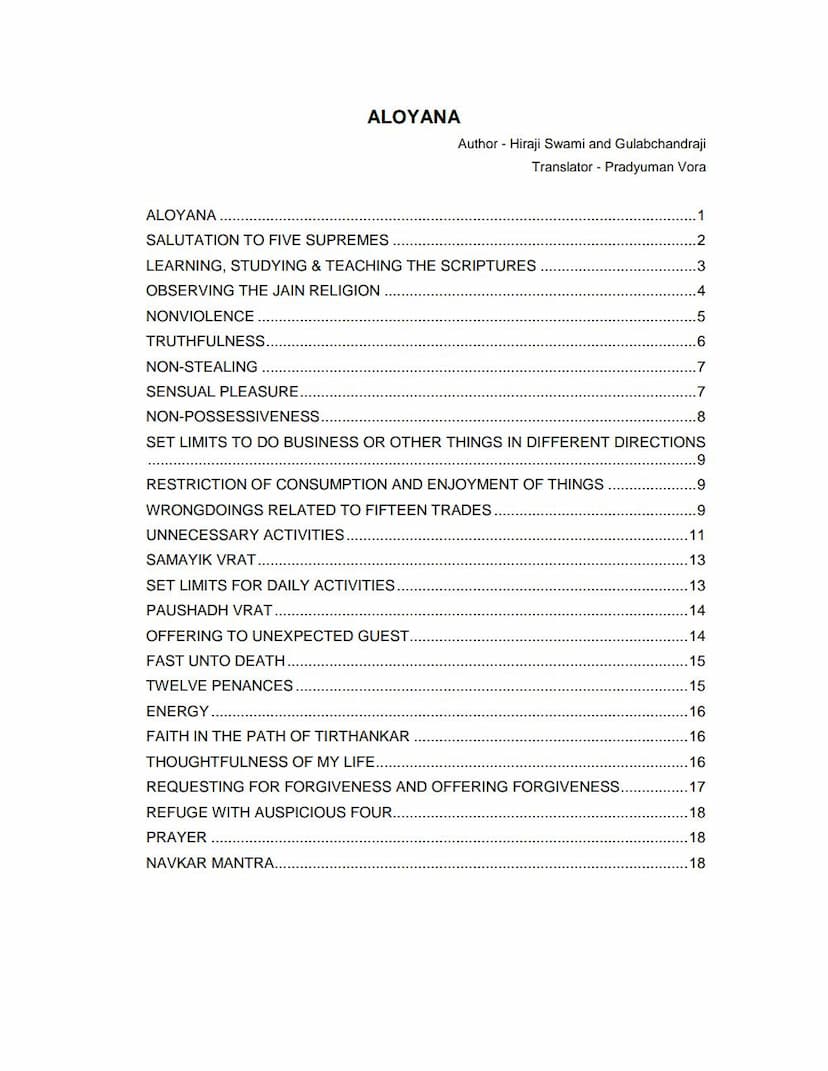Aloyana
Added to library: September 1, 2025

Summary
This Jain text, "Aloyana" by Hiraji Swami and Gulabchandraji, is a comprehensive guide to self-reflection and confession within the Jain tradition. "Aloyana" itself translates to reflection, confession, or repentance, and the book elaborates on this core practice by detailing various vows and principles of Jainism and identifying potential wrongdoings associated with them.
The book begins by listing key Jain tenets such as non-violence, truthfulness, non-stealing, Aloyana, and salutation to the Five Supremes. It then delves into the significance of Aloyana, explaining its ability to remove obstacles to liberation (Moksha) by eradicating deceit, desire for worldly returns, and perversity.
The subsequent sections meticulously outline specific areas of reflection and confession, corresponding to various Jain vows and practices. These include:
-
The Great Vows (Mahavratas):
- Non-violence (Ahimsa): This section details numerous ways one can inadvertently cause harm to living beings, from mishandling food and water to engaging in violent professions or activities.
- Truthfulness (Satya): This covers various forms of deception, including lying, misleading statements, false witness, and using harsh or insulting language.
- Non-stealing (Asteya): This addresses dishonest practices in business, misappropriation of property, cheating, and accepting bribes.
- Sensual Pleasure (Brahmacharya): This section explores wrongdoings related to lustful thoughts, actions, and behaviors, including premarital and extramarital relationships, and improper arousal of passions.
- Non-possessiveness (Aparigraha): This focuses on greed, attachment to possessions, exceeding limits of wealth and property, and the resulting negative impacts.
-
The Vows of Lay Disciples (Anuvratas) and Supporting Practices:
- Setting Limits to Business or Other Activities in Different Directions: This vow relates to restricting the scope and nature of one's worldly endeavors.
- Restriction of Consumption and Enjoyment of Things: This vow emphasizes mindful consumption, avoiding harmful foods, and not indulging in excessive or luxurious items.
- Wrongdoings Related to Fifteen Trades: A detailed list of professions and businesses considered inherently sinful or prone to causing harm to living beings, such as those involving fire, cutting trees, or dealing with animal products.
- Unnecessary Activities: This covers engaging in activities beyond basic needs, including harmful gossip, harboring ill will, excessive lamentation, and promoting violence.
- Samayik Vrat: This section details potential lapses during the practice of equanimity (Samayik), such as distraction, wicked thoughts, or not performing the practice with due diligence.
- Setting Limits for Daily Activities: This vow involves establishing boundaries for daily routines, consumption, and actions.
- Paushadh Vrat: This focuses on potential wrongdoings during the observance of a specific fasting or ascetic practice, including carelessness in checking for living beings or engaging in worldly conversations.
- Offering to Unexpected Guest (Alms to Monks/Nuns): This outlines proper conduct when offering charity to ascetics, highlighting potential offenses like partiality or offering spoiled food.
- Fast Unto Death (Santhara/Sallekhana): This section addresses the spiritual practice of fasting unto death, detailing potential wrongdoings such as improper motivation or attachment to the body.
- Twelve Penances: This covers the performance of various penances, both external and internal, and the potential for wrongdoings if performed with the wrong intentions or lack of sincerity.
- Energy: This relates to the responsible use of one's mental, verbal, and physical energy, confessing any dissipation through sinful activities.
- Faith in the Path of Tirthankar: This section emphasizes the importance of unwavering faith in the teachings of the Tirthankaras, detailing how doubt, misinterpretation, or adherence to other beliefs can be considered wrongdoings.
- Thoughtfulness of My Life: This encourages reflection on one's life goals, including renouncing worldly possessions, embracing monkhood, and preparing for death.
The book concludes with a section on Requesting Forgiveness and Offering Forgiveness, a vital aspect of Jain practice. It includes prayers for seeking pardon from all living beings and from specific categories of souls, as well as from one's relatives, friends, and spiritual guides (Gurus). The text also includes the auspicious Navkar Mantra and the traditional closing phrase, "Michchhami Dukkadam," signifying the request for forgiveness.
In essence, "Aloyana" serves as a practical manual for Jains to examine their lives, identify transgressions against the principles of their faith, and seek purification through sincere repentance and a commitment to righteous living. It underscores the continuous journey of self-improvement and spiritual progress within the Jain path.